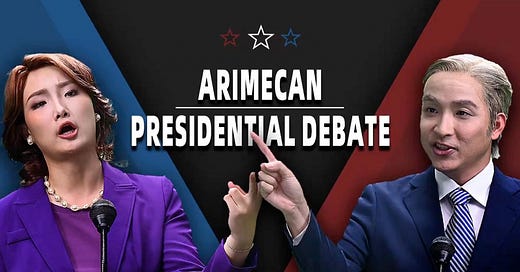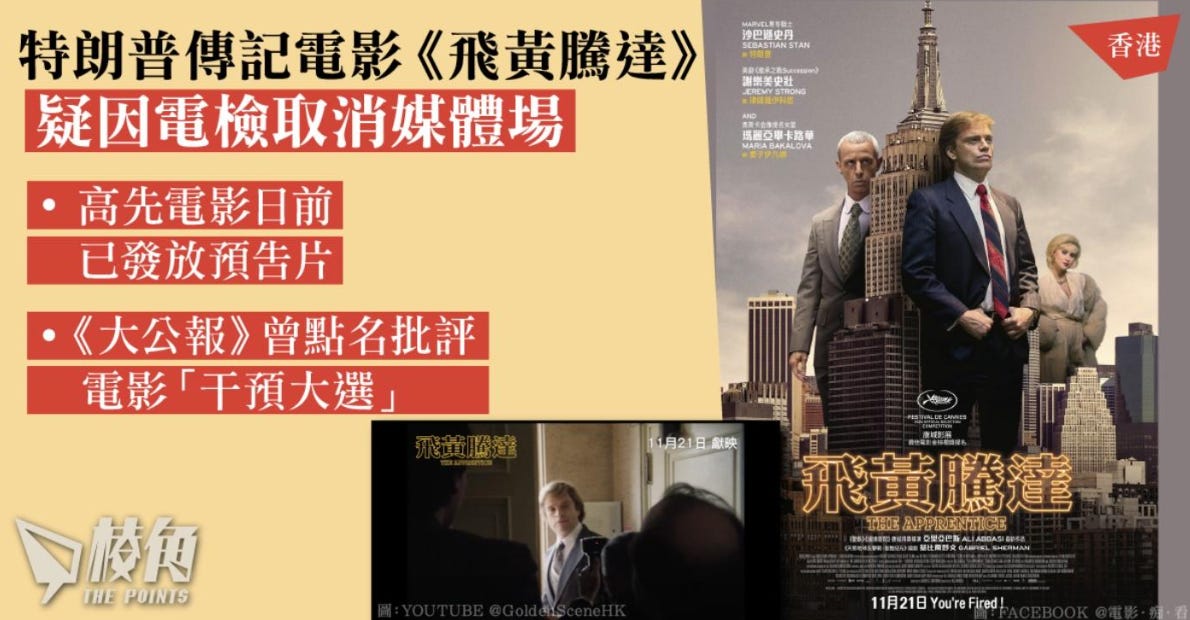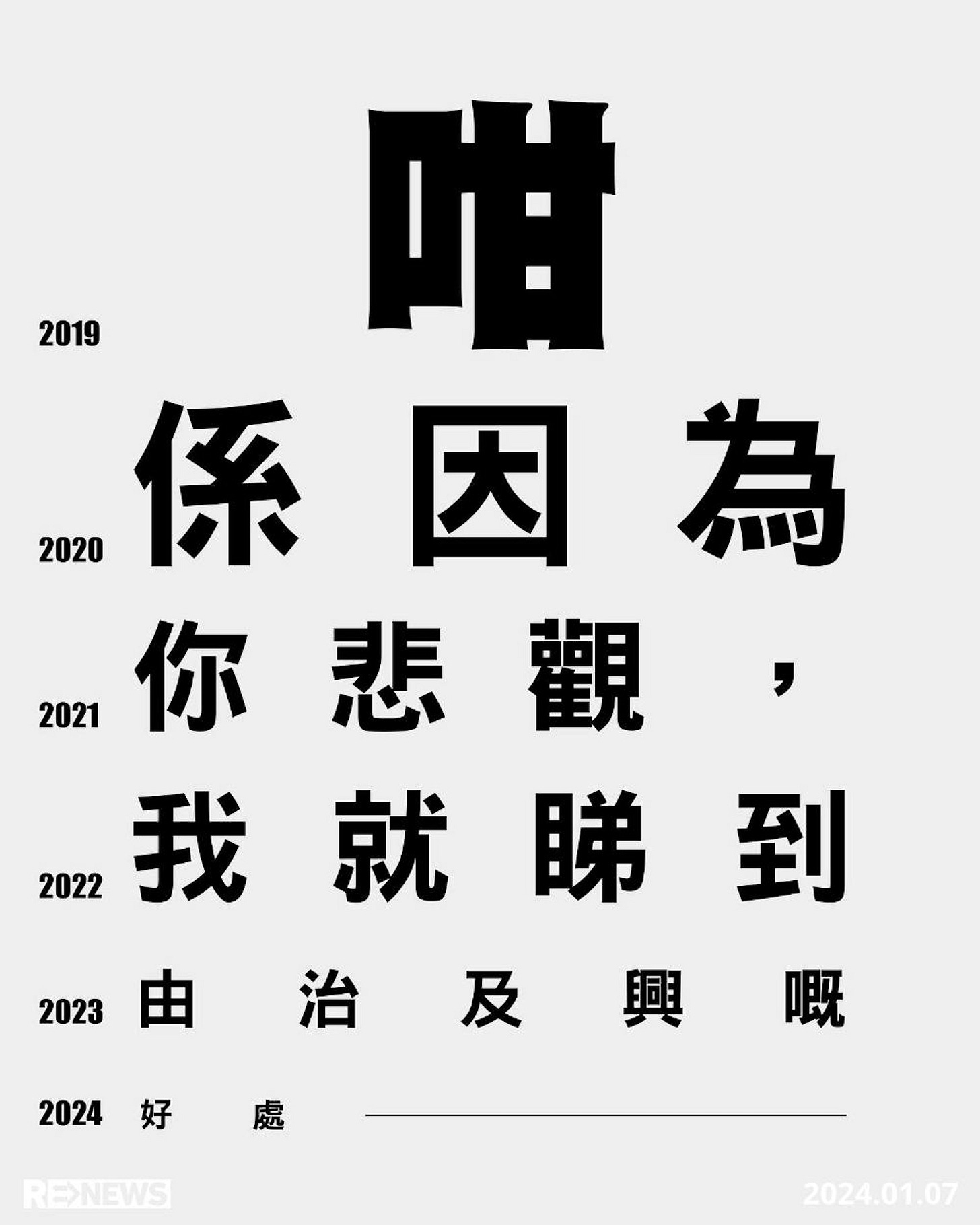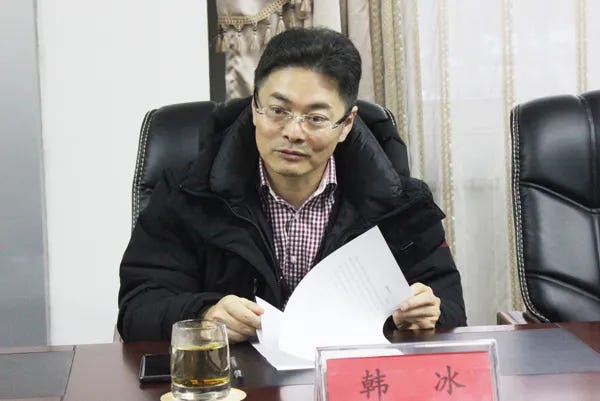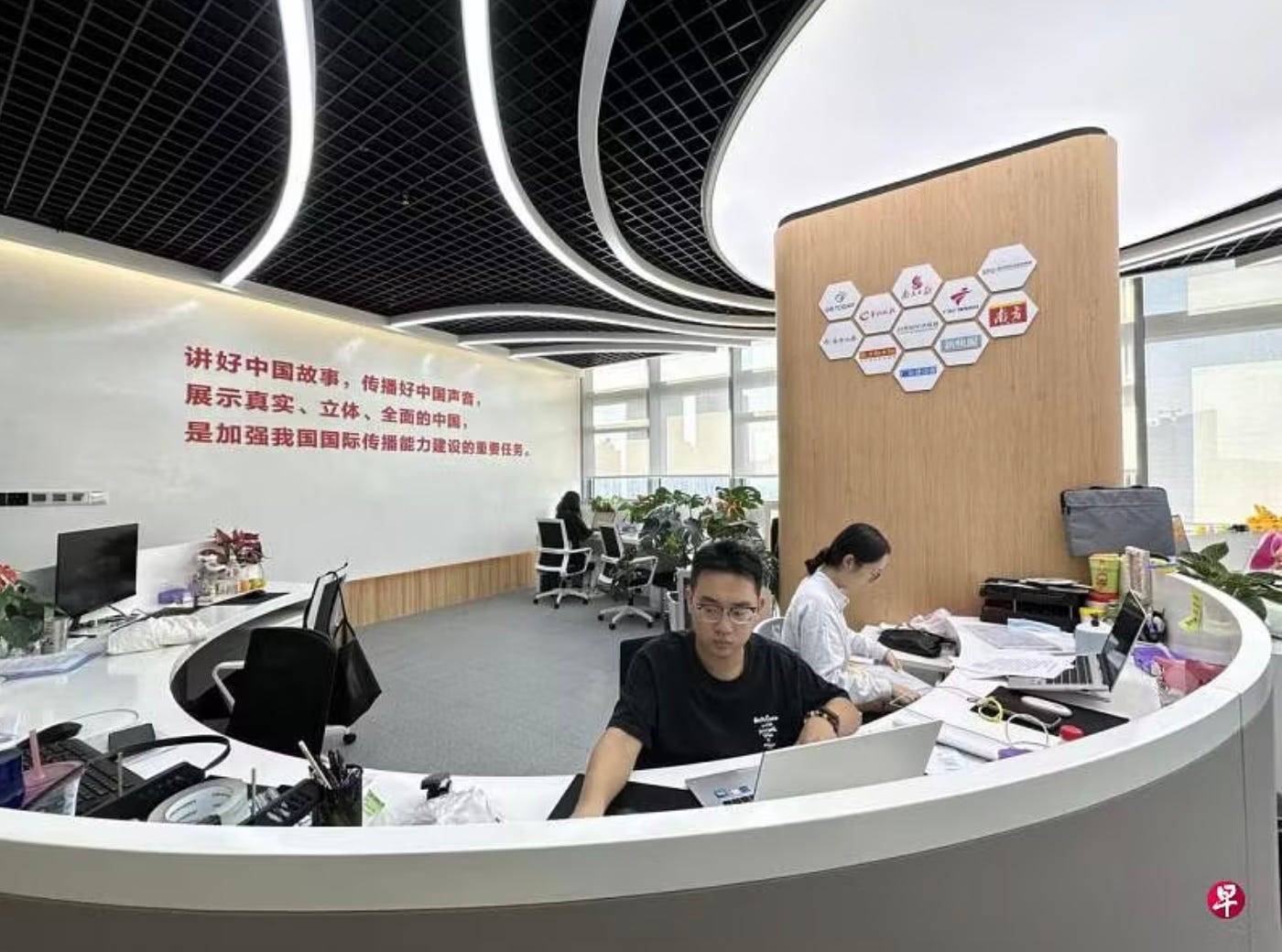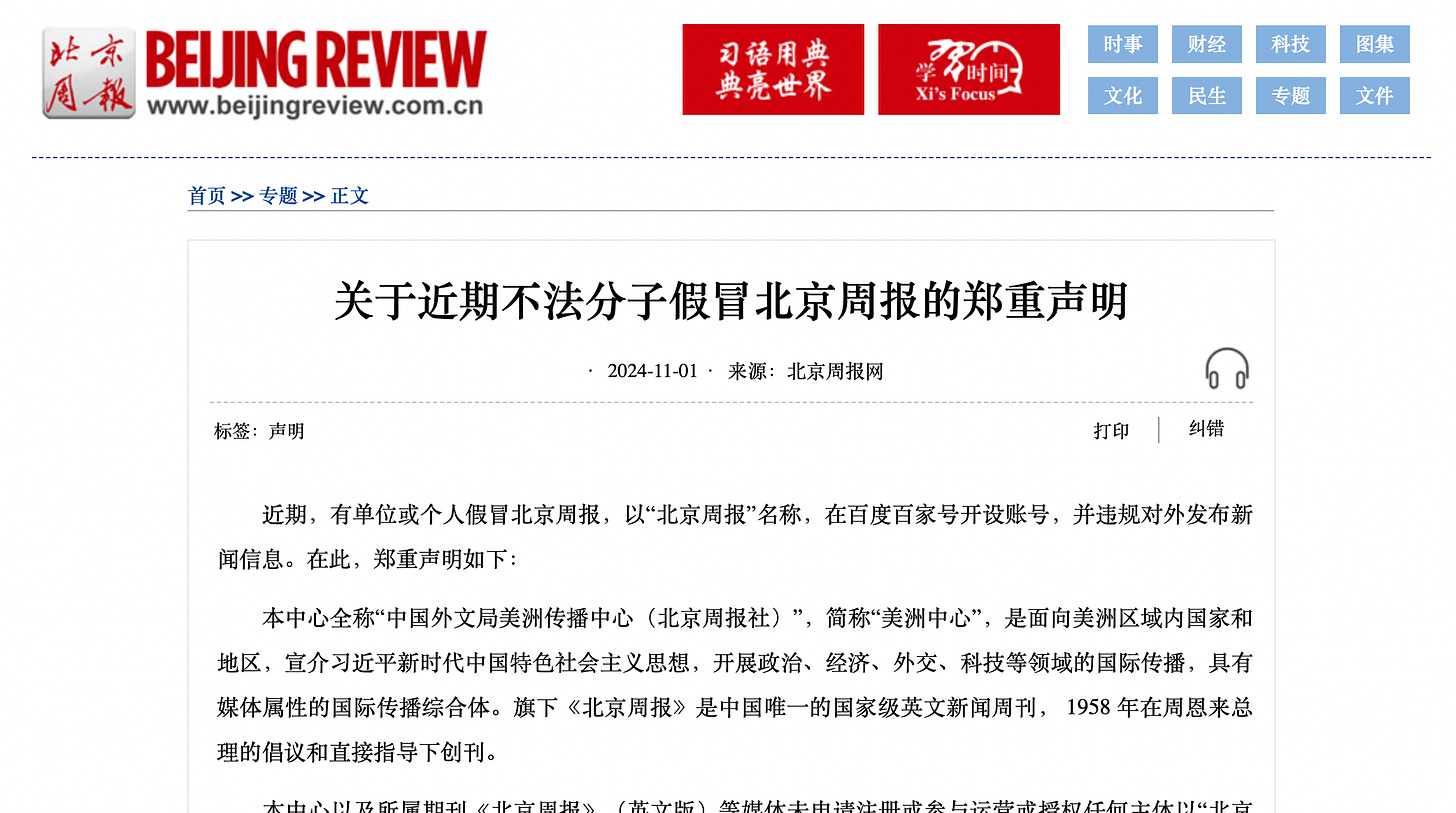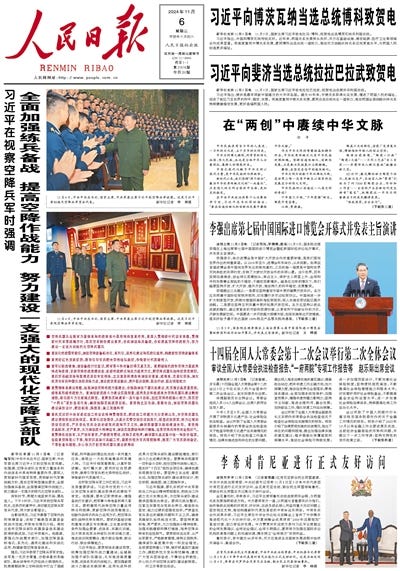Lingua Sinica Newsletter, 7 November
News, analysis, and commentary on Chinese-language media from the PRC and beyond.
Welcome back to Lingua Sinica.
As much as anyone might wish to avert their gaze, it’s impossible this week not to address the biggest news story in the world: the decisive reelection of the once and future US President Donald Trump. American voters enjoy the unique privilege of deciding not only the fate of their country but also of countries the world over who look to Washington for direction, support, and security. And that’s especially true in CMP and Lingua Sinica’s adoptive home of Taiwan.
Virtually every news source in the country has been glued to the polls, from the Beijing-friendly China Times (中國時報) to the independence-leaning Liberty Times (自由時報) and everything in between. The biggest question on both sides, understandably, is what does this mean for us? How will Trump’s second presidency affect Taiwan’s security, its pivotal semiconductor industry, and the chances of a Chinese invasion? Hong Kong activists in the US are also wondering how this will affect them, worried that they and others fleeing persecution by authoritarian states may be caught up in the mass deportations of immigrants Trump promised on the campaign trail.
PRC state media are so far behaving just as might be expected, issuing brief and matter-of-fact acknowledgments — and little else on an issue that will be regarded internally as quite sensitive. Late this morning, in a news release that will likely be on the front page of tomorrow’s People’s Daily, the official Xinhua News Agency reported Xi Jinping’s congratulatory call to Trump. It spoke tersely of the hope of peaceful, win-win relations. More revealing, however, were the comments included beneath a re-posting of the Xinhua release on the WeChat account of the other official news service, CNS. Despite being seen by over a hundred thousand users, the post had just three visible comments, all bland congratulations. This improbable lack of response is a sure sign that the discussion around Trump’s reelection is being actively monitored and controlled. China’s leadership is watching carefully, and the country’s media can only stand on the sidelines and wait.
For more on how Taiwanese media cover their own elections, you can check out our sister publication Tian Jian (田間), where editor Heng Yu Chien recently hosted a great discussion on presidential endorsements. And for more on how Chinese-language media are reporting on and reacting to this issue, stay tuned to future editions of Lingua Sinica and the CMP website.
Ryan Ho Kilpatrick
CMP Managing Editor
ANTI-SOCIAL
The Ick of It
China’s state news agency takes the low road to international communication
In the run-up to the US election, China’s official news agency Xinhua took a swing at American democracy not entirely in keeping with the dry, stolid monotone of their content most international audiences are used to.
In a five-minute-long comedy skit channeling Saturday Night Live, posted to X last week, two actors debate each other as thinly veiled stand-ins for presidential candidates Kamala Harris and Donald Trump. “Any resemblance to reality is purely coincidental,” read Xinhua’s tongue-in-cheek disclaimer for the video, set in the fictional “United States of Arimeca.” Both candidates hurl bizarre insults at each other and the scene rapidly descends into anarchy. In a follow-up video released on election day, both declare victory and roll out a series of identical policies. The point, of course, is that US democracy is illusive, chaotic, and obsessed with demonizing China. Released only in English, it seemed intended for American and other English-speaking audiences.
It’s an odd look for a news agency that views itself as the equal of Reuters or AFP, and claims — despite its unmistakable commitment to serving the ruling CCP — to be free of “political bias.” But it’s not the first time Xinhua has tried its hand at comedy. In 2022, they released “It’s Ameri-cracy,” a music video lampooning the US political system set to the tune of historic New Zealand sea shanty “The Wellerman,” which had recently enjoyed a renaissance thanks to the lockdown trend of “ShantyTok.” The same year, they also produced a James Bond spoof that took aim at British intelligence’s concerns over PRC spying. Despite winning plaudits from itself, though, Xinhua’s jokes tend to go down like a lead balloon among foreign audiences.
FLASHPOINTS
Bye Bye, Biopic
Was a Trump film fired in Hong Kong?
According to Points Media (棱角媒體), an online news outlet founded by Hong Kong media professionals scattered across the globe in the wake of the city’s national security law, a screening of the film biopic “The Apprentice” (飛黃騰達) planned for October 31 at Hong Kong’s Coventry Cinemas was canceled due to a “censorship issue” (電檢問題). The film, which explores Donald Trump's record in the real estate business in New York City in the 1970s and 80s, has been a source of controversy in the United States, where its theatrical release this year was delayed by efforts by Trump’s legal team to block its release.
The film’s Hong Kong distributor, Golden Scene Cinemas (高先電影), did not respond to a request for more specifics about the “censorship issue” in question, Points Media reported. Hong Kong’s EDigest (經一) also reported the news, but offered no further details.
“The Apprentice,” which tells the story of a young Trump in the 1970s, a second son determined to carve out his reputation at any cost, premiered at the Cannes Film Festival in May this year. According to a trailer released in mid-October, the biopic was set for a Hong Kong theatrical release on November 21.
TRACKING CONTROL
Hu Xijin Logs Back On
After several months of radio silence, Hu Xijin (胡锡进), the once outspoken former editor-in-chief of China’s state-run Global Times tabloid, last week resumed posting on his influential Weibo account. The combative commentator is known for his fiery rhetoric praising Xi Jinping and lambasting the West. He is often considered to have close links to CCP inner circles as well, and has been looked to as a bellwether for where the leadership wishes to guide public opinion. But Hu’s normally incandescent social media channels went dark in July after he offered an apparently unsanctioned interpretation of the Politburo’s Third Plenum decision. Hu’s latest Weibo posts are much the same as before, a months-long gap between timestamps the only sign of something amiss. He has not addressed his absence.
But Weibo users did notice. Thousands of his fans piled into the comments to welcome Hu back. More skeptical netizens know him as “Frisbee Hu” (飞盘胡), a dog running whichever way his masters throw the Party line. But in recent years Hu’s stands against the worst excesses of online nationalism — like defending CCP-favored author Mo Yan when a blogger tried to sue him for disrespecting Chairman Mao — have made him sound like a relative voice of reason.
“Your opinions may not all be correct, but you are objective, fair, calm, and positive,” read one upvoted comment. But others have not forgotten his reputation for obedience: “Old Hu is back! That’s great! I can walk and play with my dog every day again!” reads the most-liked comment.
Perhaps Hu’s comeback should have been expected. His “Hu Says” column in the Global Times has been quiet since July, but was never removed from its prominent position on the newspaper’s homepage, suggesting his spell in the wilderness was always expected to be brief. However, Hu still has not posted on his blue-check X account. Perhaps the former editor still needs to prove that he can be trusted with a VPN again.
DISREPUTATIONS
News Sensations
Taiwanese media go gaga over a lurid China crime story
On October 28, five people, including three children, were seriously injured in a brutal knife attack outside a primary school northwest of Beijing’s city center. The news was delivered only through a brief official police notice (通报) shared widely on Chinese news sites and social media, without additional reporting. It noted that the perpetrator had been “controlled at the scene,” and that the victims were in stable condition. The exclusive use of the police notice from the official account of district police in Beijing was further demonstration of a broader trend in China, where original newsgathering from news media has been usurped by cryptic announcements from government and police-run accounts known as “government affairs new media” (政务新媒体).
But as this skimpy story crossed over the Taiwan Strait, where many media thrive on low-quality and sensationalistic news, it quickly transformed into a grisly and gratuitous eye-catcher.
ETtoday, a new media founded in Taiwan in 2011 and claiming to reach 90 percent of netizens in the country, reported the basics of the attack based on the police notice, and included a five-second video from the Chinese video-sharing site Douyin showing the victims huddled on the pavement after the attack. Not to be outdone, CTWant, part of the Want Want Group media conglomerate, noted in its headline the gruesome detail that one child victim had their fingers severed in the attack. While giving attention to the story, Taiwan’s state media agency, CNA, took a more even-handed approach, not playing up visuals of the attack.
But the most revealing treatment — a metaphor, perhaps, for Taiwan’s uneasy obsession with news sensations — came from Mirror Media (鏡週刊), a tabloid outfit founded in 2016. Mirror scrambled the police notice into a quick news brief, topped by an image combining the police notice with a black-and-white scene of the attacker being restrained, blood spattered across the pavement. The face of the attacker was pixeled out. Meanwhile, the face of the man restraining the attacker was covered, inexplicably, with the cartoon image of a kitten.
STORYTELLERS
Soulless in Hong Kong
Hong Kong cinema has lost its soul, according to one of the city’s most renowned filmmakers. In an interview with BBC over the weekend, Johnnie To (杜琪峯) said both he and Hong Kong itself now felt soulless due to a lack of freedom over the past few years. To, the man behind police and crime thrillers like PTU, Election (黑社會), and Drug War (毒戰) blamed Hong Kong’s political situation since the national security crackdown began for “the lowest point in [his] life.”
The real reason for this outlook, retorted the state-owned Ta Kung Pao (大公報), must be “personal reasons” of To’s, and “not objective reality.” This unironic response seemed a paraphrase of a now-viral meme mocking the government’s dismissiveness toward their critics: “That’s just because you’re pessimistic; I see the advantages of transition from governance to prosperity” (咁係因為你悲觀,我睇到由治及興帶嚟嘅好處). In one of several pieces attacking To since his BBC interview, the newspaper sarcastically listed the “wonderful films” To has directed more recently, inserting screen-captured images of negative user reviews on a mainland Chinese reviewing platform. “These are a far cry from classics like A Hero Never Dies (真心英雄) and Exiled (放逐),” Ta Kung Pao’s writer mused, referencing more of To’s popular films from the 1990s and 2000s. The implication: To has just lost his touch, and is blaming the government for his own failure.
“Film censorship is a common practice in many countries,” Ta Kung Pao wrote, defending the growing censorship regime that has seen numerous films banned from public screening since Beijing imposed a national security law on the city in 2020. On Monday, its sister newspaper Wen Wei Po (文匯報) interviewed the chairman of the Hong Kong Motion Picture Industry Association (MPIA), who told them that the industry’s recent downturn had nothing to do with censorship. “Those who make normal films won’t feel any restrictions,” he said, “only those that badmouth Hong Kong will say there’s no freedom of expression.” The MPIA, as a litmus test of their loyalties, earlier warned its members to “think twice” before attending Taiwan’s Golden Horse film awards.
The solution to To’s troubles? It’s simple, according to the Ta Kung Pao and Wen Wei Po: produce movies that the government would like to see. “The film he should have made is The Gangster Jimmy Lai!” (黑社會之肥佬黎) they suggest, referring to the founder of the pro-democracy Apple Daily (蘋果日報). Lai has been in jail awaiting trial on national security charges since 2020, while his newspaper was shut down by authorities the following year.
MISDIRECTIVES
Darkness Over Urumqi
In a jarring and sensational documentary released last month, CGTN, the global broadcasting arm of the CCP-run China Media Group (CMG), rationalized the leadership’s iron-fisted approach to Xinjiang by playing up the horrors of the July 5, 2009, riots in the region’s capital city of Urumqi. The documentary moves rapidly from opening scenes of violence and vandalism to interviews with police, security officials, and others on the specter of separatism in Xinjiang — and the supposed involvement of the United States.
Early in the documentary, the case of Uighur economist Ilham Tohti, who according to CGTN was sentenced to life in prison for "using his position to spread separatist ideology through his lectures,” is presented as support for the idea that prominent members of the Uighur community advocated violent terrorism and religious extremism. The argument, like much else in the documentary, runs counter to the facts about Tohti’s life and work. While Tohti, the founder of the Uighur Online website, certainly was an outspoken critic of Beijing’s policies on Uighurs, the consensus in the Uighur community is that he never advocated independence — instead focusing on constructive criticism. His daughter, Jewher Ilham, has consistently described him as a moderate voice.
The attack on Tohti is followed by an awkward interview in which Zheng Liang, a professor of journalism at Jinan University who received his PhD at the University of Colorado Boulder, appears to stiffly read a prepared script from a prompt just off-camera. Other sources include a captain in the Pakistan Air Force, who alleges a CIA conspiracy. And in another strangely stiff soundbite, East China Normal University professor Josef Gregory Mahoney — a regular source for reports almost exclusively in China’s state media — suggests ominously that "Xinjiang is only one among many fronts in a broader and ongoing (American) strategy to encircle and suppress China.”
A clue to the production of this “documentary” comes in the closing credits, where “Special Thanks” is given to the Information Office of the People’s Government of Xinjiang, as well as to the China Society for Human Rights Studies (CSHRS). While it claims to be a non-profit social organization, the CSHRS is directly overseen by the CCP’s Central Propaganda Department, which also operates the China Media Group.
NEWSMAKERS
“Chinese People” Grates on Taiwanese Ears
When beloved actor and Cantopop crooner Andy Lau (劉德華) performed in Taiwan for the first time in over a decade last week, one song on his setlist stood out — the patriotic ballad “Chinese People” (中國人).
Chinese state media lapped it up, with PRC state broadcaster CCTV and state-run Hong Kong newspaper Wen Wei Po heaping praise on Lau for the song choice. Among Taiwanese people, however, “Chinese People” was bound to be more contentious. Commentators in the “pan-green” camp of the ruling Democratic Progressive Party, which champions Taiwan’s political autonomy and distinct cultural identity, slammed Lau for spreading CCP propaganda. Others spread the false rumor that Lau is a member of the National Committee of the Chinese People’s Political Consultative Conference, an advisory body known to include celebrities.
Yang Qifeng (楊起鳳), Deputy Editor-in-Chief for entertainment at commercial Taiwanese broadcaster TVBS, wrote an opinion piece that slammed “unnecessary political interference” and argued that music should be appreciated as “a form of pure artistic expression.” Yang recalled that Lau had participated in a ceremony marking Taiwan’s National Day in 1993. Whether he’d do so again in 2024, however — with Beijing firmly in control of his native Hong Kong as well as the fortunes of virtually every artist in the region — is quite another matter.
IN THE NEWS
Out in the Cold
Earlier this week, Xi Jinping’s unending crusade against undisciplined CCP cadres netted a senior propaganda official in northeast Liaoning province. Han Bing (韩冰), vice-chairman of the state-owned Liaoning Radio and Television Group (辽宁广播电视集团), was placed under “review and supervision” by the provincial Commission for Discipline Inspection on November 4, citing “serious violations of discipline and law.” The term is the authorities’ typical euphemism for corruption, but what exactly Han stands accused of remains vague.
Liaoning Radio and Television, or LRTV, began as the northeast branch of the state-run Xinhua news agency in 1946, as Mao’s communists quickly took over the region from the surrendering Japanese forces, with Soviet aid. During the era of media commercialization, it rose to become one of the country’s most successful TV networks. This wouldn’t be the first time the broadcaster was implicated in a corruption scandal, however. In 2012, former LRTV executive Shi Lianwen (史联文) was convicted of taking cash payouts totaling 11.4 million yuan (about US$1.8 million). “While Liaoning Television did achieve influence, this was not by adhering to the cause of the Party,” Shi tearfully admitted in a videotaped confession, uploaded to the Central Commission for Discipline Inspection (CCDI) website. In recent years, the CCDI has had its own robust media operation, including a regular video series called “Clean China” (廉潔中國) that among its content offerings runs video confessions.
Xi’s nominal anti-corruption campaign has lasted as long as his tenure in office. Relying as it does on targeting individual cadres rather than instituting checks and balances or opening the CCP to outside scrutiny, it is likely to go on indefinitely, bringing down the genuinely unscrupulous as well as Xi’s critics and perceived rivals for as long as he holds onto power.
CMP IN THE HEADLINES
Lianhe Zaobao goes inside China’s growing network of ICCs
Writing for Singapore’s Lianhe Zaobao (聯合早報) this week, reporter Daryl Lim (林煇智) offered a rare inside perspective on China’s international communication centers (國際傳報中心), or ICCs, which are a crucial piece in the leadership’s efforts to remake its infrastructure for global media and public opinion influence. As CMP has reported continuously over the past two years, ICCs are an effort by the Chinese Communist Party to leverage the strengths of local media groups and propaganda offices to conduct what it calls “external propaganda” (外宣).
Lim was part of a visiting group of 15 media from Southeast Asia that included reporters from Malaysia, Thailand, Singapore, and Indonesia, as well as from Hong Kong and Macau. The group was invited on a two-day tour of Guangzhou’s sparkling new Greater Bay Area (Nansha) International Communication Center, a city-level ICC that was established in February 2023. Lim’s report demonstrated clearly how the country’s ICCs are being used not just as a network of content-production nodes for international communication, but are meant to engage more closely with foreign journalists — even “cooperating” on coverage of Chinese issues.
As he introduced the center’s facilities to visiting journalists, Niu Siyuan (牛思遠), the director of the ICC, even highlighted as a selling point its free internet connection to the world, without interruption by China’s Great Firewall. “Our communication center has an international IP network,” Niu told the journalists, according to the Lianhe Zaobao report. “When you work here, you don't need to use a VPN to go over the wall.”
The report quoted CMP Director David Bandurski as saying that while entrusting external communication to the local levels in China may seem to be a form of “decentralization” (去中心化), it is in fact a form of coordination and amplification. Bandurski has called described the ICC trend, in fact, as "centralization+"
In its coverage of the two-day ICC visit, Macau’s Teledifusão de Macau (TDM) a public broadcaster that says its mission is to “serve the people of Macau and around the world,” was notably flaccid by comparison. Without providing context, the report parroted Niu Siyuan as he emphasized the role of media in publicizing positives about the region. "I think the media in Hong Kong and Macau can play a unique role in publicizing the Greater Bay Area,” said Niu.
According to CMP’s latest count, there are currently 26 provincial-level ICCs operating across China, including in municipalities like Shanghai and Chongqing. Many more operate at the city level.
(BACK) IN THE NEWS
State Media vs. Fake Media
Earlier this week, the Beijing Review (北京周报), a paper operated by the CCP-run China International Publishing Group (CIPG), released a statement announcing that they had been counterfeited online. The offenders had engaged in “business activities” like publishing news and “advertising promotions” under the name of the magazine, an English-language weekly that has for decades — ever since it was launched as the weekly Peking Review in 1958 — been central to the leadership’s international communication efforts.
It was all a bit deja vu. Just last month, we reported how the People’s Daily released a similar statement condemning netizens who passed their own work off as an official commentary by the flagship Party paper. We noted an uptick in such “copycat” (套牌) articles — that is, fake news from the public disguised as authoritative reports from state media or government websites.
As we also noted back then, this is a risk inherent in any environment where the government exercises a monopoly on the truth. Like forging currency, forging the truth becomes as straightforward as mimicking the look and feel of what the authorities print. As the Cyberspace Administration of China gets tougher on “self-media” (自媒体) — citizen journalists unaffiliated with official outlets — expect such forgeries to become more profitable, and more common.
NEWSPEAK
Creating Meaning
Yesterday’s People’s Daily front page featured an article headlined: “Continuing the Lineage of Chinese Culture Through the Two Creates” (在“两创”中赓续中华文脉). According to the piece’s byline, it was written by Ren Ping (任平), a homophonic pen name for “People’s Daily Commentary” (人民评论), assigned to important articles meant to represent the views of CCP’s Central Committee.
It’s therefore worth asking — what exactly are these “Two Creates” (两创)? The idea, writes “Ren Ping,” is closely linked to two other Xi-isms we’ve previously explained in the CMP Dictionary: “soul and root” (魂和根) and the Two Combines (两个结合). The “Two Creates” — referring, respectively, to “creative transformation and innovative (creative) development” (创造性转化和创新性发展) — are the means by which China’s culture has endured for thousands of years. It is through these “Two Creates” that traditional Chinese culture is still around to serve as the “soul and root” and realize the Two Combines in the New Era ushered in by Xi Jinping.
Despite only recently emerging as a set tifa (提法) or official framing device, the phrase itself appears to have been lifted from a speech Xi Jinping gave at a Politburo Study Session all the way back in February 2014. At the time, Xi stressed the importance of innovating traditional culture to integrate it more closely with social values — a prerogative of the Two Combines.
A decade later, the People’s Daily adds that transformation and innovation are themselves Chinese traditions. The continuity of Chinese culture, they argue, is not a sign of its stagnation but the fruits of ongoing adaptation that has enabled China’s culture to survive for so long. The idea that Chinese culture needs to change, therefore, is in fact a form of continuity — traditions have to change, but change is traditional. This comes in the wake of a Politburo study session last week on how to “build a culturally strong country” (文化強國). Xi stressed the need to blend Chinese culture with both Marxism and the latest tech to make it relevant in this day and age.


